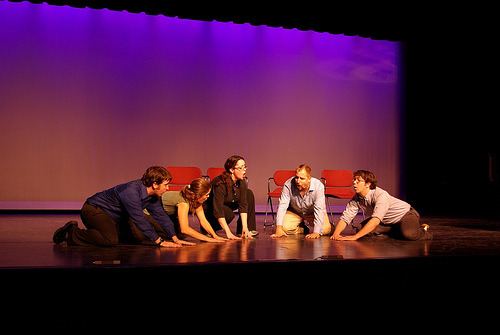
“If people never did silly things, nothing intelligent would ever get done.”
– Ludwig Wittgenstein, Austrian philosopher
My improv experience
About 10 years ago I attended an improv workshop with my local troupe at the IO Chicagoand I came back a changed man.
I had already been performing improv for a couple of years, but this introduction to Chicago (the mecca of improv) was truly inspiring. After spending only a few days surrounded bytalented performers and receiving great coaching from fantastic directors, I started to understand who I was as a person. My improv experience on this trip unlocked me in a way that nothing else had. As a result, I fell in love with this art form, and I’ve been hooked ever since.
Why is improv awesome?
Improv is the art of making things up. It’s usually performed on stage in front of a live audience that provides suggestions to inspire the scenes. While it’s typically associated with comedy, some improv troupes focus on other genres like improvised musicals or improvised Shakespeare-esque plays. When the lights go up, the only guarantee is that no one in the room knows what’s about to happen, and there will never ever be another show performed exactly like it.
At Resound, we believe that improv is a fantastic tool for collaboration, team-building, creative brainstorming, and cultivating a culture of open, productive communication.
Here are 7 reasons why we’ve decided to infuse improv into our company:
1. Listening
Improv teaches us to listen.
There’s nothing more fundamental to understanding people and their needs than being a good listener. Listening isn’t waiting for your turn to speak. It’s truly absorbing and digesting what the other person is saying and how they’re saying it.
Improv teaches us absolutely everything is important. If we stop listening for one second, we may miss out on an opportunity to support our teammates’ ideas and make them look brilliant. At Resound, we need to pay attention to everything our clients and our teammates are communicating — written, spoken, or unspoken. We need to listen to the tone and character of our clients so well that we know their brand intimately and can develop an authentic experience on their behalf that really connects with their audience.
2. Support
Improv teaches us how to support each other.
The principle of saying “Yes and” is an essential concept in improvisation. It’s a “rule” that’s drilled into the heads of every beginning improviser. The “yes and” rule exists because creativity can’t go anywhere without acceptance and support. In improv, there are no wrong answers, and every choice you make on stage is the right choice. Your teammates accept and receive your choices as “gifts” and their sole focus is on heightening, building, and growing the gift that you’ve given them. At Resound, we need to accept creative ideas and give them space to grow. When one of us makes a statement with a brand concept or a design, the rest of us acknowledge and accept the work. Then, we add our own creative input to build it into something even better than it was before.
3. Making statements
Improv teaches us to make bold statements.
When performing improv, the cast members on stage need to know how to make statements and stay committed to their ideas, no matter how awkward they felt about the at first. The performers shouldn’t merely commit to their statements, but they should cling to them and hold on for dear life. In improv, you don’t have the luxury of revisions, the delete key, or command-Z. Things get really ugly when all the performers are unsure who they are, where they are, how they know each other, or what the heck is going on. As an audience member, you can tell when a performer is stuck in her head, and you can’t wait for the next scene.
At Resound, we want our clients to stand out. We want to help them make bold statements that both make it clear to their audience what they believe in and help serve as building blocks for the future.
4. Speaking from the heart
Improv teaches us to go deeper.
Everyone has such a wide variety of emotions, ideas, and experiences to draw from, but improvisers learn how to tap deep into that well and let it all out on stage. This allows for really crazy character choices and amazing scene work that leaves an audience breathless. At Resound, we insist on asking deeper questions. We push ourselves past the first few design or copy choices that pop into our heads. Improv teaches us to tap into our own internal search engines and pull out all of that awesome, gooey goodness that’s embedded deep within the realm of both ours and our clients’ experiences.
5. Being flexible
Improv teaches us to be more responsive to change.
When someone makes a surprising choice during an improv show, the other players have no choice but to be quick on their feet. When the audience screams out a suggestion, the improvisers don’t have any time to think about their next two or three moves, they just have to roll with it, even if they have no idea what they’re doing. At Resound, the parameters of our projects tend to change, and we have to be fluid and agile to skillfully respond to those changes at a moment’s notice.
6. Embracing the awkward
Improv teaches us it’s ok to be uncomfortable.
I don’t remember a single moment on an improv stage that didn’t feel awkward at first. However, it’s usually the most awkward moments on stage that end up being the most successful. Sometimes we tend to shy away from uncomfortable situations, conflict, or ambiguity. Improv teaches us to be more candid, honest, straightforward, and to speak from our gut. I’ve seen many different companies suffer from a simple lack of trust, candor, and openness. When people don’t feel like tackling something head-on because it’s strange or awkward, the entire team gets held back.
7. Achieving “Group Mind”
Finally, improv teaches us to trust the mind of the group.
There is a big difference between groupthink and group mind. Groupthink is unconsciously absorbing the ideas of those around you without having to do any thinking yourself. Group mind is a conscious awareness of where the group is headed, which both listens and contributes to the group. Groupthink is when others think for you. Group mind is when others think with you. Groupthink is lazy. Group mind takes a lot of work!
Groupthink is when everyone on a team says ‘yes’ to the first idea, or the most charismatically presented idea, or the idea that will stir up the least controversy, simply because it’s easier to just say yes than to attack the problem together and come up with the best possible solution.
Group mind is the holy grail of improv. Group mind is when everyone is listening, “yes and”-ing, making strong statements, speaking from the heart, adapting to changes, and embracing and filling space in perfect harmony. Each member of the team knows when it’s his or her turn to contribute. Everyone knows their roles and speaks with conviction and respect. The team is buzzing with creativity, energy, and enthusiasm.
Improv reminds us we’re a team, where everyone trusts each other. We all know each member is here to build one another up and make each of our ideas better. We can honestly believe the work we come up with as a group will be a million times better than what we would have come up with on our own.
Improv is the winner!
For us, improv isn’t just about being silly and having fun for a few minutes at the office. It’s a great way to build our team, improve our creative process, and build our own personal communication skills. We practice improv because it exercises those muscles required to be sincerely engaged, present, and responsive. We want to develop real human connections with each other, with our clients, and for our clients and their customers.
Have you tried using improv at your company, or as part of your process? If so, how did it go? If not, would you consider it?
(*photo credit – House of Sims, used under cc license)



